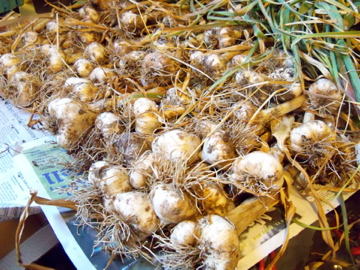 Lately I have been investigating what variety of open-pollinated corn to grow. At first I could only find a few varieties, but as I dug deeper names like “Howling Mob” and “Six Shooter” started to appear. My likely favorite is still “Country Gentleman”, a corn whose kernels are not lined up neatly in rows but just thrown in willy-nilly.
Lately I have been investigating what variety of open-pollinated corn to grow. At first I could only find a few varieties, but as I dug deeper names like “Howling Mob” and “Six Shooter” started to appear. My likely favorite is still “Country Gentleman”, a corn whose kernels are not lined up neatly in rows but just thrown in willy-nilly.
I am going to hazard a guess, gentle reader, that you have never had open-pollinated sweet corn. I don’t think I have either. Open-pollinated corn is not as sweet and does not hold as well as modern hybrids – it has to be eaten right away.
So what does open-pollinated mean, anyway?
Open-pollinated seeds are just regular seeds. It’s easiest to describe them by describing what they are not. The converse are hybrid seeds. Hybrid seeds are the offspring of two different strains or varieties of the same plant.
Most of what we eat is grown from hybrid seeds. All our grocery store tomatoes, for instance. Hybrids are not GMO’s. Hybrid seeds are produced using traditional plant breeding techniques (think Gregor Mendel). Often, hybrids have increased vigor, making them more productive and therefore popular with commercial growers and home gardeners alike.
Often, consumers assume that unique or different colored and shaped eggplants, peppers, and other vegetables at the market must be heirlooms. In fact, they are often hybrids. Take the adorable fairy tale eggplant, for example. Heirloom tomatoes have been the exception, but now so called “Heirloom Hybrids” have the look of heirlooms but are in fact hybrids.
For a seed-saver, hybrids have one main draw back – the second generation will have significant genetic variation. You may get some plants with the desired traits of the parent, but it is highly unpredictable and you will get lots of unusable stuff. Hybrids seeds must be bought from a seed company each year.
Why save seeds when you can just buy ’em?
In explaining why we at Tubby Creek Farm think open-pollinated seeds are important, I guess I had better start by explaining why seed saving is important.
There is one argument that goes something like, “hybrids produce higher yielders therefor will feed more people, therefor hybrids will end global hunger”, and there is another argument that goes “open-pollinated seeds put food production capacity in the hands of local communities and increases self-sufficiency, therefor the only way to ensure a global food supply is through open-pollinated seeds.” As with most idealogical arguments, the two sides are mostly talking past each other (here’s a hint: it’s not an argument about seeds, it’s an argument about power).
It is my belief that, ultimately, food security stems from farmers having control over their seeds. People eat every day, most of us a few times a day, so food is big business. There is a lot of greed in this world, and there are a lot of people who are trying to wring was much money as possible out of the food system. This makes me uncomfortable about the future of our food. It makes me a little uncomfortable about handing over the ability to produce seeds – the stuff that all our lives depend on – to someone whose main interest is making money.
OP seeds have other benefits. By growing OP varieties, we are preserving genetic diversity and keeping regionally adapted varieties alive. These varieties have biological value, as well as unique culinary attributes and a cultural history.
Farmers should have the capacity and the right to save their seed from year to year. We shouldn’t give up our freedom and independence just for the convenience of buying new seed every year.
Sure, we may save money by saving seeds, but it takes time and effort. Probably more time and effort than justifies the savings. We will never be seed independent because of the isolation requirements of certain types of crops. Seeds from slef-pollinating plants like tomatoes? No problem. Seeds from wind pollinated plants like corn? With acres of GM corn all around us? I think not.
As for the corn, we are probably going to compromise and grow some hybrid sweet corn next year along with the open-pollinated stuff. We know that if you dipped an ear of sweet corn in sugar it still wouldn’t be too sweet for some! If the OP stuff grows well and is well received by market and CSA customers, maybe we can wean ourselves off the hybrids.



